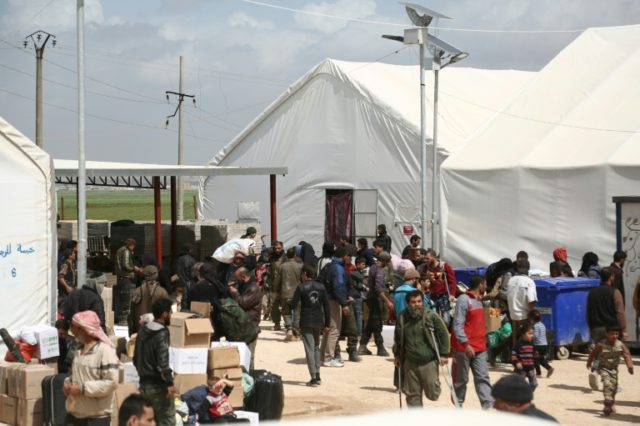Maarat al-Ikhwan (Syria) (AFP) – Just days ago, Fadi al-Shami was struggling to buy overpriced baby milk in Syria’s besieged and bombed Eastern Ghouta. Now evacuated to Idlib, he can finally afford to feed his infant.
Shami’s family was among tens of thousands of people bussed out of a pocket of Ghouta under a negotiated rebel withdrawal that ended a relentless weeks-long bombing campaign by government forces.
“In Ghouta, when I left the hose to get milk and diapers for my 11-month-old son Wissam, I would say goodbye to my wife and tell her I may not come back,” Shami, 30, told AFP.
“I would go from one village to the next, just to find 200 grammes (half a pound) of milk,” he recalled.
Even before the Syrian government began its Ghouta assault on February 18, the opposition stronghold was crippled by a restrictive half-decade siege.
Food, fuel and other basic necessities became difficult to find, and anything that was available was prohibitively expensive.
“The cost of powdered milk in Ghouta reached 17,000 Syrian pounds a kilo ($39),” said Shami, while in Idlib it costs less than a quarter of that amount.
“I reached Idlib to find basic necessities are all available. The people, life in general here is different from Ghouta. I feel like I’m in heaven.”
Shami, his wife, and young baby reached the rebel-held northwest province of Idlib this week under an evacuation deal between rebels and regime backer Russia.
More than 36,000 people have been bussed out of Ghouta under two such agreements, while a third set of talks over the largest Eastern Ghouta town of Douma has stalled.
– ‘Here, I can play’ –
Shami had worked in Ghouta as a media activist, documenting years of siege and escalating bombardment, but ultimately decided last week to evacuate.
He took the hours-long journey with thousands of his neighbours to Idlib, also hard-hit by Syria’s war but nearly incomparable to bombed-out Ghouta.
As soon as he stepped off the bus, he bought cans of soda, biscuits and potato chips for his family at 1,500 Syrian pounds ($3) — what a single can costs in Ghouta.
“I didn’t think I’d live to buy what we need at this low a cost in Idlib province,” said Shami, who now rents a home in the town of Binnish.
“In Ghouta, the situation was tragic. We were living in hell — the means of living were just not there,” he said.
Many who have made it to Idlib have no relatives to stay with or ways to pay for a home, and have been forced to stay in displacement camps.
Outside one temporary shelter in Maarat al-Ikhwan, excited yelps rang out from a group of boys locked in a competitive football match.
“In Harasta, we were scared and terrified,” said 13-year-old Qais al-Hallaq, whose hometown of Harasta was the first to secure an evacuation deal.
“We never dared to go leave the shelter to play football, but here I can play with my friends,” he added.
Back in Ghouta, the thin, pale boy gathered and sold plastic jugs and nylon bags.
“Here, we can get food and biscuits. But there, we couldn’t get any good food,” he said.
– ‘Unlike anything else’ –
More than 2,000 people live in the Maarat al-Ikhwan camp, which is supported by the United Nations and aid organisations.
For Abu Laameh, evacuated from Harasta last week, even the camp is better than Ghouta.
“It feels like we were at the bottom of a well, and someone pulled us out above ground,” he told AFP.
“The war we had was something unlike anything else in the world.”
Waving his lit cigarette above his head, Abu Laameh said the last one he bought in Ghouta had cost him 850 Syrian pounds — nearly $2.
In Idlib, an entire pack costs 200 pounds, or less than 50 cents.
“Ghouta’s siege was very suffocating. God saw to it that we came here, where it’s safe,” said the elderly man, who wore a green vest atop multiple layers.
The siege had caused prices to jump up in Ghouta, but the offensive also contributed to skyrocketing costs.
Earlier this month, the UN’s humanitarian coordination branch (OCHA) said the onslaught damaged several Ghouta bakeries, causing a 25-fold increase in bread price.
Abu Qassem, 40, is glad to be safe in Maarat al-Ikhwan, but said he still fears for the future.
“Having food and drink isn’t everything in life. We want to know what’s going to happen to us,” he said.

COMMENTS
Please let us know if you're having issues with commenting.